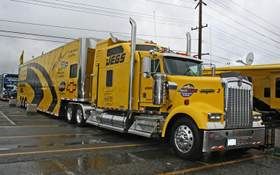I'm Driving. Now What?
Topic 12076 | Page 1

Our general consensus will be to stay with HOW for at least 1 year. A few weeks on the road without incident is nothing in the grand scheme of things. Continue to focus on that safe driving record during that time. Also work on getting those endorsements that you are interested in. If you are happy with HOW and can get that 1st year under your belt then your options will be endless from that point on.
HOS:
Hours Of Service
HOS refers to the logbook hours of service regulations.
New OTR with HOW. Been on the road for a few weeks without incident. Any advice on what I should do next to advance my career? I do not have student loans so I'm pretty much free to do whatever. When I see carriers like Crete claiming 45 cpm with four months experience, I feel it would be dumb to not consider my options when I'm making 32 cpm. (Although I am happy with HOW in general and endorse them as a company.)
Also, should I be working on FAST pass, TWIC , passport, hazmat or other credentials? If there is a way to make 80k a year doing this, I want to find it. Also interested in driving in Canada just for the fun of it. Years ago I drove through Calgary in a personal vehicle and loved it.
Love this site!
Unless there is a compelling reason to jump ship (and there usually isn't) I would stick it out, get your year of experience before considering jumping ship.
Don't fall for the grass is greener on the other side promising higher pay and more mileage, etc. As long as you are getting mileage and being treated fairly, moving to another carrier at this point in your career is premature and likely turn out to far less than your expectations. Learn your craft and learn it well.
Safe travels.
HAZMAT:
Hazardous Materials
Explosive, flammable, poisonous or otherwise potentially dangerous cargo. Large amounts of especially hazardous cargo are required to be placarded under HAZMAT regulations
OTR:
Over The Road
OTR driving normally means you'll be hauling freight to various customers throughout your company's hauling region. It often entails being gone from home for two to three weeks at a time.
CPM:
Cents Per Mile
Drivers are often paid by the mile and it's given in cents per mile, or cpm.
TWIC:
Transportation Worker Identification Credential
Truck drivers who regularly pick up from or deliver to the shipping ports will often be required to carry a TWIC card.
Your TWIC is a tamper-resistant biometric card which acts as both your identification in secure areas, as well as an indicator of you having passed the necessary security clearance. TWIC cards are valid for five years. The issuance of TWIC cards is overseen by the Transportation Security Administration and the Department of Homeland Security.

First, you'll need more than a few weeks before jumping ship. If you're just planning that's cool but don't get impatient.
I can't speak for other companies but it's possible to make 80k a year at mine. The deal is you would have to stay out driving all year around and be a trainer that drives teams as much as possible. The trainer is paid for ALL of the miles of the trainee and so you can turn as much money as a team into your checks. I don't know how training works at other companies. Walmart is also, last time i checked, one of the highest paying dry van companies in the country. I think their average pay was 75k a year or something. I know that certain LTL freight companies pay upwards of 60 cents a mile. I don't know exactly how that translates to yearly gross but it should get to looking pretty nice.
LTL:
Less Than Truckload
Refers to carriers that make a lot of smaller pickups and deliveries for multiple customers as opposed to hauling one big load of freight for one customer. This type of hauling is normally done by companies with terminals scattered throughout the country where freight is sorted before being moved on to its destination.
LTL carriers include:
- FedEx Freight
- Con-way
- YRC Freight
- UPS
- Old Dominion
- Estes
- Yellow-Roadway
- ABF Freight
- R+L Carrier
Dry Van:
A trailer or truck that that requires no special attention, such as refrigeration, that hauls regular palletted, boxed, or floor-loaded freight. The most common type of trailer in trucking.
Our general consensus will be to stay with HOW for at least 1 year. A few weeks on the road without incident is nothing in the grand scheme of things. Continue to focus on that safe driving record during that time. Also work on getting those endorsements that you are interested in. If you are happy with HOW and can get that 1st year under your belt then your options will be endless from that point on.
Definitely would not change companies without good reason. Any ideas which endorsements are in demand by carriers?
HOS:
Hours Of Service
HOS refers to the logbook hours of service regulations.
Hello BoTox! You've been OTR a few weeks an are already looking at moving? Hmmm. That seems awfully fast to me. As far as Haz mat an such, I'd suggest getting them as it never hurts to have every tool you can to help your career. Good luck with whatever you decide to do.
OTR:
Over The Road
OTR driving normally means you'll be hauling freight to various customers throughout your company's hauling region. It often entails being gone from home for two to three weeks at a time.

For endorsements you have to consider your specifics companies need and use. If i were to get a passport it would, at times, cost me money. Because few people at my company have them i would be required to go pick up or split canada loads an the expense of very long bounces. Because of that i haven't gotten one yet. Hazmat would be the same boat actually. I may be required to bounce 300 miles at 20 cents a mile because i was the only hazmat endorsed nearby. Your company may be different though.
HAZMAT:
Hazardous Materials
Explosive, flammable, poisonous or otherwise potentially dangerous cargo. Large amounts of especially hazardous cargo are required to be placarded under HAZMAT regulations

Any ideas which endorsements are in demand by carriers?
The more endorsements you have the more valuable you will be and the more opportunities you will have. If anything I would definitely recommend Hazmat as it will probably be the more widely used one.
HAZMAT:
Hazardous Materials
Explosive, flammable, poisonous or otherwise potentially dangerous cargo. Large amounts of especially hazardous cargo are required to be placarded under HAZMAT regulations

Walmart requires a minimum of 3 years OTR experience and clean driving record. They start drivers at 80 plus.
Another option to consider OS LTL carriers. Their drivers do quite well. One of the forums regular contributors is a line hail driver for an LTL carrier. You will need Hazmat and doubles to drive for an LTL company.
HAZMAT:
Hazardous Materials
Explosive, flammable, poisonous or otherwise potentially dangerous cargo. Large amounts of especially hazardous cargo are required to be placarded under HAZMAT regulations
LTL:
Less Than Truckload
Refers to carriers that make a lot of smaller pickups and deliveries for multiple customers as opposed to hauling one big load of freight for one customer. This type of hauling is normally done by companies with terminals scattered throughout the country where freight is sorted before being moved on to its destination.
LTL carriers include:
- FedEx Freight
- Con-way
- YRC Freight
- UPS
- Old Dominion
- Estes
- Yellow-Roadway
- ABF Freight
- R+L Carrier
OTR:
Over The Road
OTR driving normally means you'll be hauling freight to various customers throughout your company's hauling region. It often entails being gone from home for two to three weeks at a time.
Doubles:
Refers to pulling two trailers at the same time, otherwise known as "pups" or "pup trailers" because they're only about 28 feet long. However there are some states that allow doubles that are each 48 feet in length.

line hail driver
I don't know what that is, but it sounds really scare. 
New Reply:
New! Check out our help videos for a better understanding of our forum features

















Preview:








 TT On Facebook
TT On Facebook
New OTR with HOW. Been on the road for a few weeks without incident. Any advice on what I should do next to advance my career? I do not have student loans so I'm pretty much free to do whatever. When I see carriers like Crete claiming 45 cpm with four months experience, I feel it would be dumb to not consider my options when I'm making 32 cpm. (Although I am happy with HOW in general and endorse them as a company.)
Also, should I be working on FAST pass, TWIC , passport, hazmat or other credentials? If there is a way to make 80k a year doing this, I want to find it. Also interested in driving in Canada just for the fun of it. Years ago I drove through Calgary in a personal vehicle and loved it.
Love this site!
HAZMAT:
Hazardous Materials
Explosive, flammable, poisonous or otherwise potentially dangerous cargo. Large amounts of especially hazardous cargo are required to be placarded under HAZMAT regulations
OTR:
Over The Road
OTR driving normally means you'll be hauling freight to various customers throughout your company's hauling region. It often entails being gone from home for two to three weeks at a time.
CPM:
Cents Per Mile
Drivers are often paid by the mile and it's given in cents per mile, or cpm.
TWIC:
Transportation Worker Identification Credential
Truck drivers who regularly pick up from or deliver to the shipping ports will often be required to carry a TWIC card.
Your TWIC is a tamper-resistant biometric card which acts as both your identification in secure areas, as well as an indicator of you having passed the necessary security clearance. TWIC cards are valid for five years. The issuance of TWIC cards is overseen by the Transportation Security Administration and the Department of Homeland Security.